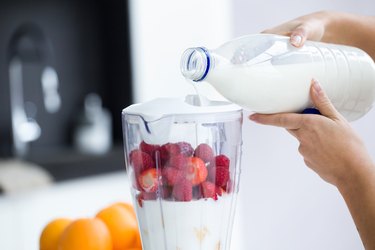
If you've ever seen products labeled "dairy-free" and "lactose-free," you've likely wondered what the difference was. (Psst, they're not the same!) If you've been using the terms interchangeably, here's why you should finally stop.
What's the Deal With Dairy-Free and Lactose-Free Products?
Video of the Day
The terms "dairy-free" and "lactose-free" are completely different and should be thought of as such. Just because something is lactose-free, that does not mean it is dairy-free. However, if something is dairy-free, it's also lactose-free.
Video of the Day
It sounds tricky, but here's the breakdown: Lactose is the primary carbohydrate found in milk and dairy products. It's a disaccharide, meaning it's made up of two different sugar molecules, glucose and galactose. To digest lactose, the enzyme lactase must be present.
When a dairy-based product is labeled "lactose-free," the lactose has been removed. When a product is labeled "dairy-free," this is an indication that there is no dairy in the product and that the product is also lactose-free.
Read more: Should You Cut Dairy From Your Diet?
Is Lactose Intolerance Different From a Dairy Allergy?
People who are lactose intolerant naturally lack adequate amounts of the enzyme lactase — which is why they're unable to comfortably digest the milk sugar. If you or a pal is lactose intolerant, you're probably familiar with the host of unwanted GI symptoms that follow a bite of dairy ice cream. For those unfamiliar with the effects, just think everything from uncomfortable gas and bloating to vomiting and diarrhea. Yikes!
An intolerance to lactose isn't the same as an allergic reaction; rather, it's a sensitivity, the result of an enzyme deficiency that will generally resolve with a low-lactose diet. When someone has a dairy allergy, on the other hand, an immune reaction is present. People who are allergic cannot eat any dairy, regardless of whether it's lactose-free.
People with a dairy allergy can't tolerate a protein found in those products — likely casein — even in small amounts. If they do, the body treats the protein as a foreign substance and attacks itself, causing an allergic reaction, which can involve the skin and respiratory system as well as the gastrointestinal tract, according to the British Journal of General Practice. Lactose intolerance produces a GI reaction only — uncomfortable tummy troubles, sure, but non-life-threatening.
What to Look for on the Label if You're Lactose Intolerant
Reading labels and deciphering what you can have if you are lactose intolerant takes a little bit of extra attention. If the product is clearly labeled lactose- or dairy-free, then good news: You can have it! Some people who are intolerant report being able to digest fermented forms of dairy that have lower lactose content such as yogurt and kefir.
When it comes to cheese, the lactose load varies. Soft cheeses have more lactose in comparison to hard cheeses, which explains why those who are intolerant may not have symptoms after eating sharp cheddar but do suffer after indulging in a bagel with cream cheese.
Because there is no one-size-fits-all approach, you should experiment to see what products and how much you can tolerate, and let that inform your future choices. Another option is to take a digestive supplement that contains the enzyme lactase when eating any dairy-based foods. You can also enjoy vegan and dairy-free nut-, pea- and grain-based milk alternatives (such as almond milk).
What if You're Avoiding Both Dairy and Lactose?
If your goal is to completely avoid dairy, there are a few unexpected culprits that will show up on products' ingredient lists that you should look out for. Any product that contains whey, galactose, casein, nougat, lactulose or rennet contains dairy. It's also possible that dairy is lurking in labels such as "natural flavoring" or "artificial flavoring."
Even more troubling: Something that says "non-dairy" may not necessarily be dairy-free. If you're allergic, it's important to meticulously check the label in full before digging in.